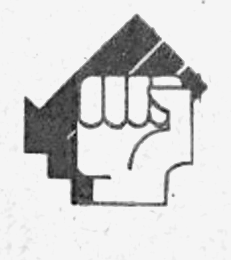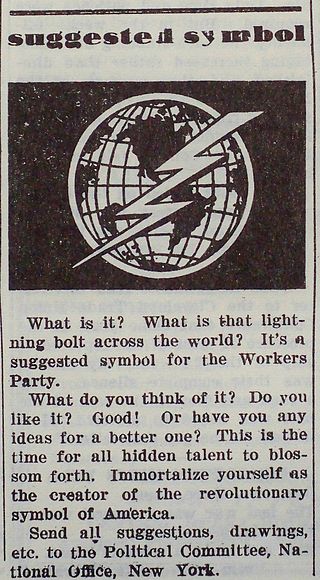
Trotskyism is the political ideology and branch of Marxism developed by Russian revolutionary and intellectual Leon Trotsky along with some other members of the Left Opposition and the Fourth International. Trotsky described himself as an orthodox Marxist, a revolutionary Marxist, and a Bolshevik–Leninist as well as a follower of Marx, Engels, Vladimir Lenin, Karl Liebknecht, and Rosa Luxemburg.

Socialist Appeal was the British section of the International Marxist Tendency (IMT), founded in 1992 alongside the IMT by supporters of Ted Grant and Alan Woods after they were expelled from the Militant tendency of the Labour Party. The organisation relaunched itself in 2024 as the Revolutionary Communist Party.

The Workers and Peasants' Socialist Party was an ephemeral socialist organisation in France, formed on June 8, 1938, by Marceau Pivert. Its youth wing was the Workers and Peasants' Socialist Youth.
Socialist Party has been the name of several political parties in India, all of which have their roots in the Congress Socialist Party during the freedom struggle.
The Kisan Mazdoor Praja Party, or Praja Party for short, was a political party of India. Established in 1951, it merged with the Socialist Party to form the Praja Socialist Party in the following year. The Andhra unit of the party, however, revived the old party under the name "Praja Party" and lasted for a few more years.
Elections were held in March 1952 for the Bihar Legislative Assembly. There were 276 constituencies with 50 of them being two-member constituencies. The Indian National Congress (INC) stormed into power. Shri Krishna Singh became the first elected Chief Minister of Bihar and Dr. Anugrah Narayan Sinha became the first Deputy Chief Minister cum Finance Minister of the state.
Centrism has a specific meaning within the Marxist movement, referring to a position between revolution and reformism. For instance, the Independent Social Democratic Party of Germany (USPD) and British Independent Labour Party (ILP) were both seen as centrist because they oscillated between advocating reaching a socialist economy through reforms and advocating revolution. The parties that belonged to the so-called Two-and-a-half and Three-and-a-half Internationals, who could not choose between the reformism of the social democrat Second International and the revolutionary politics of the Communist Third International, were also exemplary of centrism in this sense. They included the Spanish Workers' Party of Marxist Unification (POUM), the Independent Labour Party (ILP) and Poale Zion.
The third camp, also known as third camp socialism or third camp Trotskyism, is a branch of socialism that aims to oppose both capitalism and Stalinism by supporting the organised working class as a "third camp".

The Workers Party of the United States (WPUS) was established in December 1934 by a merger of the American Workers Party (AWP) led by A.J. Muste and the Trotskyist Communist League of America (CLA) led by James P. Cannon. The party was dissolved in 1936 when its members entered the Socialist Party of America en masse.
Revolutionary socialism is a political philosophy, doctrine, and tradition within socialism that stresses the idea that a social revolution is necessary to bring about structural changes in society. More specifically, it is the view that revolution is a necessary precondition for transitioning from a capitalist to a socialist mode of production. Revolution is not necessarily defined as a violent insurrection; it is defined as a seizure of political power by mass movements of the working class so that the state is directly controlled or abolished by the working class as opposed to the capitalist class and its interests.
The Revolutionary Communist Party was a British Trotskyist group, formed in 1944 and active until 1949, which published the newspaper Socialist Appeal and a theoretical journal, Workers International News. The party was the ancestor of the three main currents of British Trotskyism: Gerry Healy's Workers Revolutionary Party, Ted Grant's Militant and Tony Cliff's Socialist Workers Party.
United Front, known until 1971 as Mini Front (1970–1971) and as Maxi Front (1971–1979) thereafter, was a coalition of political parties in Kerala state, India, which was the ruling combine in the state from 1970 to 1979. The coalition was formed by five political parties immediately before the 1970 Kerala Legislative Assembly election. It saw the inclusion a few other parties in the following years.
Incontent://media/external/downloads/39116 1967 Fourth general elections held in Uttar Pradesh. The Indian National Congress won the most seats as well as the largest share of the popular vote. But it could not secure enough seats for a majority and so a coalition of other parties formed the government with Charan Singh as the Chief Minister of Uttar Pradesh.
Communism in Sri Lanka dates back to 1935, when the Lanka Sama Samaja Party was founded by Trotskyists who campaigned for freedom and independence of Sri Lanka which was then a colony of the British Empire and known as Ceylon.
Elections to the Fourth Odisha Legislative Assembly were held 1967.



